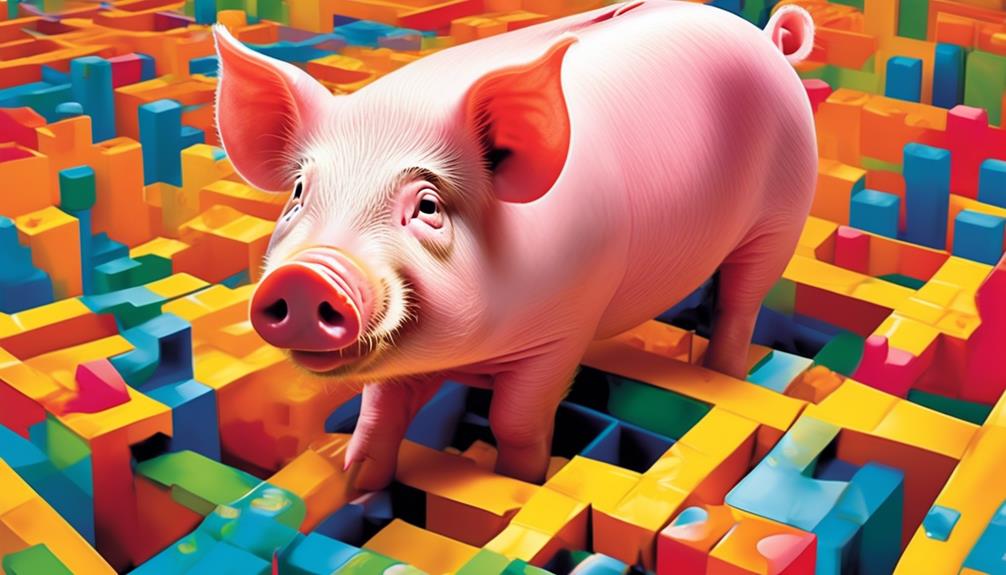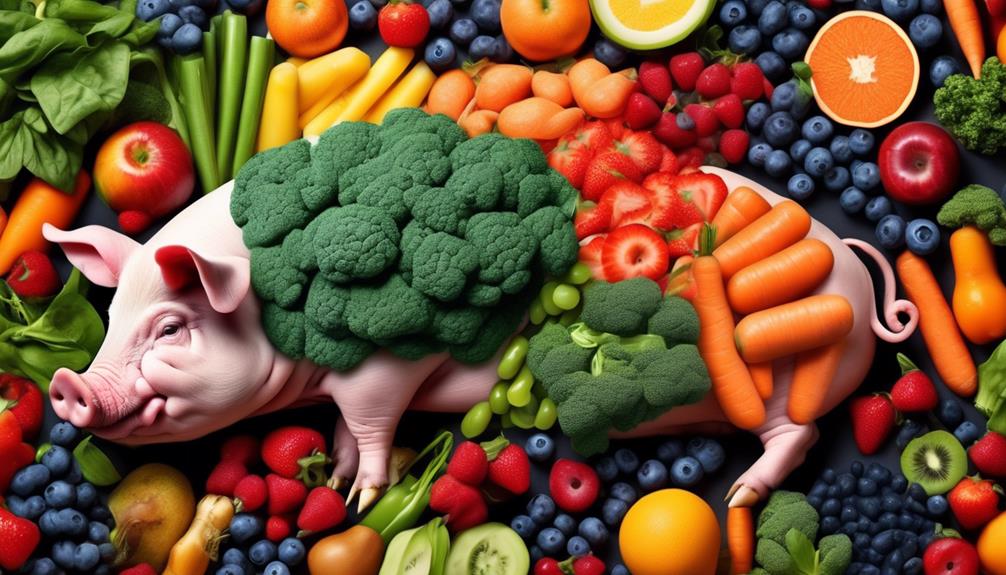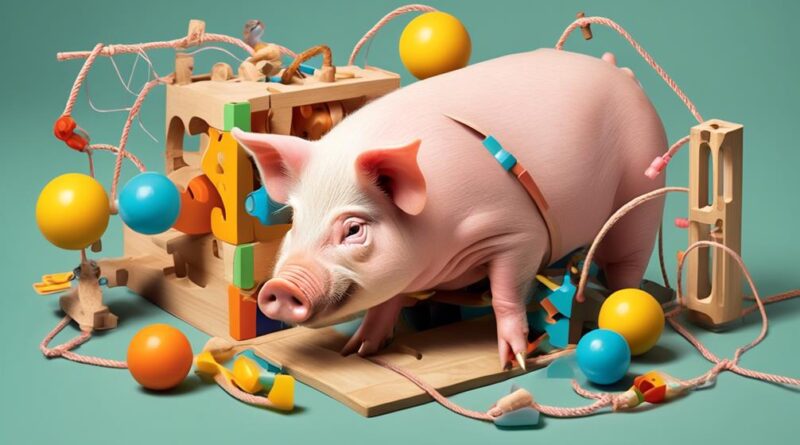Seven Tips: Enhancing Your Pig's Cognitive Abilities
Are you looking for ways to support your pig's cognitive abilities and overall mental well-being?
While pigs are known for their intelligence, there are specific strategies you can implement to enhance their cognitive capabilities.
By incorporating a few simple techniques into your pig's daily routine, you can help them reach their full mental potential and improve their quality of life.
Understanding Pig Intelligence
To understand pig intelligence, observe their problem-solving skills and social interactions closely. Pig behavior can provide valuable insights into their cognitive abilities. Pigs are highly social animals, often forming complex social structures within their groups. They exhibit a wide range of behaviors, from rooting and foraging to vocalizations and group communication. By observing their behavior, you can gain a better understanding of their cognitive development and learning styles.
Pigs display various learning styles, including observational learning, trial and error, and social learning. They learn from observing and imitating the behaviors of other pigs, which indicates a level of cognitive sophistication. Understanding their learning styles can help in devising effective training methods and enrichment activities to enhance their cognitive abilities.
Cognitive development in pigs can be measured through various methods such as problem-solving tasks, memory tests, and social interaction assessments. By evaluating their performance in these tasks, you can gauge their cognitive abilities and identify areas for improvement. This measurement provides valuable information for assessing their intelligence and developing strategies to support their cognitive development.
Enriching Your Pig's Environment
Consider enriching your pig's environment with a variety of stimulating activities and resources to promote their cognitive development and overall well-being. Encouraging play and mental stimulation is essential for the intellectual and emotional growth of your pig. Pigs are intelligent animals that thrive in environments that offer them opportunities to engage in exploratory behavior and problem-solving activities.
To enhance your pig's environment, provide them with interactive toys such as puzzle feeders or treat balls. These toys can engage your pig's cognitive abilities as they work to obtain the hidden treats, promoting mental stimulation and preventing boredom. Additionally, consider introducing novel objects or rearranging their living space from time to time to encourage curiosity and exploration. Rotating toys and introducing new ones periodically can also prevent habituation and keep your pig mentally engaged.
Another way to enrich your pig's environment is through positive reinforcement training. Teaching your pig new commands and tricks not only provides mental stimulation but also strengthens the bond between you and your pig. Training sessions can be a fun and rewarding way for your pig to use their intelligence and learn new skills.
Training Techniques for Pigs
When training a pig, use positive reinforcement techniques to encourage desired behaviors and foster a strong bond with your intelligent animal. Positive reinforcement involves rewarding your pig with treats, praise, or other forms of encouragement when it exhibits the desired behavior. This creates a positive association and motivates the pig to repeat the behavior in the future.
Clicker training, a popular positive reinforcement method, involves using a clicker to mark the exact moment the pig performs the desired behavior, followed by a reward. This helps the pig understand which specific action is being rewarded, making the training process more effective and efficient.
To start clicker training, introduce the clicker to your pig by clicking and immediately offering a treat. Repeat this several times until the pig associates the sound of the clicker with a reward. Once the pig understands the association, you can begin using the clicker to mark and reinforce desired behaviors.
For example, if you're training your pig to spin in a circle, click the moment it starts to spin and then reward it with a treat. Consistency and timing are crucial in clicker training, as the pig needs to understand which behaviors result in a reward.
Remember to keep training sessions short and enjoyable for your pig to maintain its interest and motivation. Positive reinforcement and clicker training can help create a positive training experience for both you and your pig while enhancing its cognitive abilities.
Social Interaction for Cognitive Development
As you continue to foster a strong bond with your pig through positive reinforcement techniques, engaging in social interactions with other pigs and animals can significantly contribute to their cognitive development. Social play is a crucial aspect of your pig's mental stimulation and overall well-being.
When pigs engage in social play with their peers or other animals, they're exposed to various cognitive challenges that help them develop problem-solving skills, spatial awareness, and emotional intelligence.
Allowing your pig to interact with other pigs and animals provides them with opportunities to learn social cues and communication skills. Through these interactions, pigs can develop a better understanding of social hierarchies, cooperation, and conflict resolution, all of which are essential for their cognitive growth. Additionally, social interactions can enhance their ability to recognize and interpret different emotions, both in themselves and in others, leading to improved social intelligence.
Furthermore, socializing with other pigs and animals can stimulate your pig's mind and prevent boredom, which is crucial for maintaining their cognitive abilities. As they engage in playful interactions, they're constantly challenged to adapt and respond to changing social dynamics, which promotes cognitive flexibility and adaptability. This mental stimulation is vital for keeping your pig's mind active and promoting ongoing cognitive development.
Problem-Solving Activities for Pigs

Engage your pig in problem-solving activities that stimulate their cognitive abilities and encourage mental agility. Puzzle toys are an excellent way to challenge your pig's problem-solving skills. These toys often require pigs to manipulate levers, push buttons, or slide compartments to access treats hidden inside.
Interactive feeders are also great for encouraging problem-solving behaviors in pigs. These feeders dispense small amounts of food when manipulated in a certain way, requiring pigs to use their intelligence to figure out how to access the treats.
When introducing puzzle toys to your pig, start with simpler designs and gradually increase the difficulty as your pig becomes more adept at solving them. This will keep your pig engaged and prevent frustration. Similarly, interactive feeders should be initially set at an easier level, allowing your pig to understand the cause-and-effect relationship between their actions and the release of food. As your pig becomes more proficient, you can adjust the feeder to a more challenging setting.
Regularly rotating and introducing new puzzle toys and interactive feeders can prevent boredom and maintain your pig's interest in problem-solving activities. Additionally, consider incorporating these activities into your pig's daily routine to provide mental stimulation and enrichment.
Stimulating Your Pig's Senses
To continue enriching your pig's mental acuity, consider stimulating their senses through various activities and environmental enhancements. Sensory enrichment is crucial for keeping your pig engaged and mentally sharp. Here are some playtime activities and environmental adjustments you can implement to provide sensory stimulation for your pig:
- Sensory Toys: Introduce toys that make noise or have different textures to engage your pig's sense of touch and hearing. Objects like balls with bells inside or toys made of different materials can provide mental stimulation during playtime.
- Scent Exploration: Pigs have a strong sense of smell, so consider creating scent trails or hiding treats with strong scents for them to find. This activity not only engages their sense of smell but also provides mental stimulation as they search for the hidden treasures.
- Obstacle Courses: Designing simple obstacle courses with ramps, tunnels, and platforms can provide physical and mental stimulation for your pig. This activity encourages problem-solving and engages their sense of spatial awareness.
- Outdoor Exploration: Allowing your pig to explore different outdoor environments can provide a variety of sensory experiences. Different textures underfoot, such as grass, sand, or mud, can engage their sense of touch, while the sights and sounds of nature can provide mental enrichment.
Nutritional Support for Cognitive Health

Consider incorporating specific nutrients into your pig's diet to support their cognitive health and mental acuity. A brain-boosting diet is essential for enhancing your pig's cognitive abilities. Just like humans, pigs can benefit from certain nutrients that support brain function and overall cognitive health.
Omega-3 fatty acids, found in fish oil, are known to support cognitive function in animals. You can include fish oil in your pig's diet to provide these essential fatty acids. Additionally, antioxidants like vitamin E and vitamin C can help protect your pig's brain cells from oxidative stress and support cognitive health.
In addition to a brain-boosting diet, cognitive supplements can also be beneficial for your pig's cognitive health. Supplements such as choline, which is a precursor to the neurotransmitter acetylcholine, can support memory and learning in pigs. It's essential to consult with a veterinarian to determine the appropriate dosage and type of supplements for your pig, as their individual needs may vary.
Monitoring and Assessing Cognitive Progress
Assess your pig's cognitive progress regularly by observing their problem-solving skills and memory retention in everyday activities. Monitoring and assessing cognition is crucial to ensure that your pig's mental abilities are improving over time. Here are some practical tips for tracking progress:
- Observe Problem-Solving Skills: Pay attention to how your pig approaches and solves problems in their environment. This could include tasks like finding hidden treats or navigating through an obstacle course. Notice if they're becoming more efficient or creative in their problem-solving strategies.
- Memory Retention: Test your pig's memory by introducing new commands or tricks and observing how quickly they learn and retain this information. Also, observe how well they remember past training sessions and if they apply this knowledge in future activities.
- Interactive Toys: Provide your pig with interactive toys that stimulate their cognitive abilities. Monitor how they engage with these toys and if they show improvement in their interaction and problem-solving skills over time.
- Social Interaction: Assess your pig's cognitive progress by observing their interactions with other pigs or animals. Notice if they show improved communication, social skills, and adaptability in various social settings.
Frequently Asked Questions
Can Pigs Learn to Do Tricks Like Other Household Pets?
Yes, pigs can learn to do tricks like other household pets. Training techniques and cognitive development are key to teaching them. Mental stimulation and problem solving activities help pigs learn tricks and develop their cognitive abilities.
Positive reinforcement, consistency, and patience are important in training. Start with simple tasks and gradually increase difficulty. Pigs are intelligent animals and can definitely learn tricks with the right training approach.
Are There Any Specific Toys or Games That Can Help Improve a Pig's Cognitive Abilities?
To improve your pig's cognitive abilities, consider incorporating puzzle toys and enrichment activities. These can help stimulate their mind and promote cognitive development.
Learning through play is essential for pigs, just like other household pets. By providing them with interactive toys and engaging in activities that challenge their problem-solving skills, you can enhance their cognitive abilities and provide them with mental stimulation.
How Can I Teach My Pig to Communicate With Me Effectively?
To teach your pig to communicate effectively, use positive reinforcement training techniques. Understanding pig behavior is key to building trust and forming a strong bond.
Communication methods such as clicker training can help establish a clear line of communication. Encourage your pig to interact with you through simple cues and commands.
Consistency and patience are essential in teaching your pig to communicate effectively.
Will Certain Foods or Supplements Help Boost My Pig's Brain Function?
Certain brain-boosting treats and supplements can aid in enhancing your pig's brain function.
Additionally, engaging in cognitive development exercises, such as puzzle toys and training games, can stimulate their mental abilities.
However, it's crucial to consult with a veterinarian before introducing any new foods or supplements to ensure they're safe and beneficial for your pig's cognitive health.
Are There Any Specific Signs or Behaviors to Look for to Assess My Pig's Cognitive Progress?
To assess your pig's cognitive progress, observe their behaviors closely. Look for signs of improved problem-solving, memory, and learning. Cognitive development in pigs can be indicated by their ability to adapt to new environments, solve puzzles, and remember past experiences.
Additionally, watch for increased social interaction, curiosity, and playfulness, as these can be positive progress indicators. These behavioral observations will help you gauge your pig's cognitive assessment and overall progress.
Conclusion
In conclusion, by understanding pig intelligence and providing a stimulating environment, training, social interaction, problem-solving activities, sensory stimulation, and proper nutrition, you can enhance your pig's cognitive abilities.
Regular monitoring and assessment of your pig's cognitive progress will help you determine the effectiveness of these techniques.
With these tips, you can help your pig live a mentally enriched and fulfilling life.
